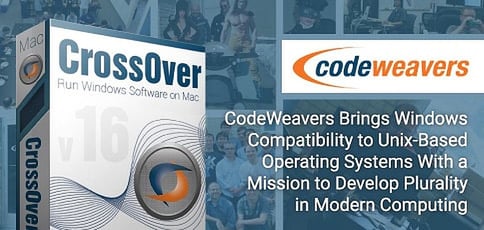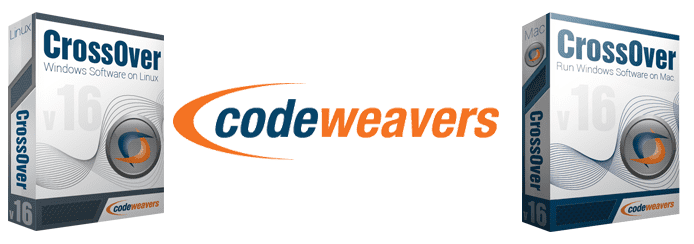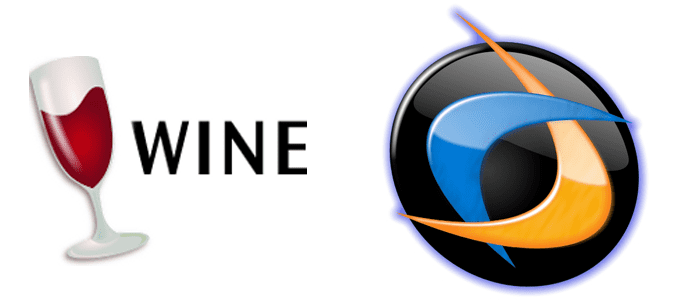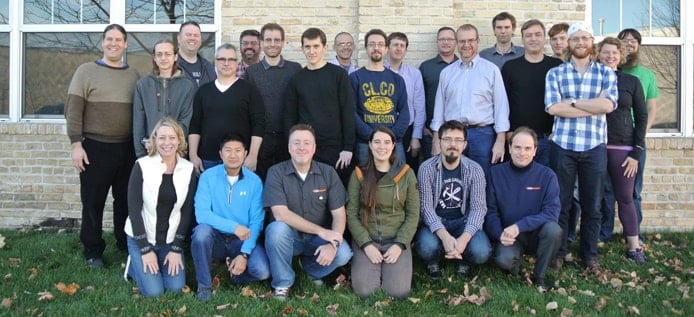
TL; DR: Founded more than 20 years ago as a general-purpose business software development tool, CodeWeavers quickly redirected its mission to focus on bringing Windows compatibility to Unix-based operating systems. Built around the popular open-source software Wine, the company’s flagship product CrossOver allows users to run Windows at native speed on Mac, Linux, and Android platforms. Backed by a dedicated and experienced support team, the company is committed to crafting custom porting solutions to meet user needs. In the process, CodeWeavers empowers businesses to optimize performance and keep their mission-critical applications online no matter the operating system they’re running.
Despite the growing cult popularity of Linux distributions, many mainstream computer users and businesses have stuck with Windows operating systems in large part due to compatibility concerns. But these worries ironically work to drive a perpetual cycle of low compatibility between applications and alternative platforms, and also create the need for emulation, file conversions, and third-party support.
Software companies develop products with their largest customer base (most often Windows users) in mind, while Unix-friendly versions are either added as an afterthought or not created at all. CodeWeavers was founded with this in mind and made it a mission to help businesses run Windows executables and other files on non-Windows systems.
It all began in the 1990s with Wine. The open-source software (originally an acronym for Wine Is Not an Emulator) was created to bridge the long-standing gap between operating systems and provide developers with support for Unix systems. Wine acts as a compatibility layer that converts Windows system calls to POSIX system calls and uses libraries similar to Windows. The software was written using reverse engineering and black box testing, making it one of the most effective means of running Windows applications on Unix systems.

CodeWeavers built CrossOver so modern businesses can run Windows applications on alternative operating systems.
CodeWeavers’s flagship product CrossOver leverages Wine’s technology and enhances it, allowing businesses and individual users to run Windows programs natively on Linux, Mac, and Android platforms. This removes the need for, say, Mac users to employ solutions, such as virtual machines, BootCamp, or Parallels Desktop, which can be expensive and eat up gigabytes.
CrossOver’s dual-booting lets users take advantage of Windows and Unix-based operating systems. The solution offers a convenient way to run Windows programs in different environments and allows full use of system resources without rebooting or requiring a paid copy of Windows.
Founded on Open-Source Software and a Commitment to Give Back
CodeWeavers began in 1996 as the passion project of Jeremy White after he discovered Wine and realized its potential. The hefty price tag associated with Microsoft and other first-party software prompted open-source coders to create free alternatives to paid products — from image editors to antivirus solutions — to paid products. In fact, the lack of compatibility with major software can be seen as the impetus behind the flood of open-source material available on these systems.
Initially, CodeWeavers helped companies port their apps to Linux as a service. With the release of CrossOver in 2001, CodeWeavers became a powerhouse of its own.

CrossOver is based on Wine technology, as CodeWeavers is committed to giving back to the open-source community.
In 2007, CodeWeavers released CrossOver Mac, and later announced a new focus on Android ports in 2016. The company continues to port software, as well as sell its own compatibility layer. CodeWeavers is dedicated to bringing compatibility to all non-Windows systems, eliminating the need for users to buy a premium OS.
Open-source software helped Unix thrive in its early days, and continues to fuel interest in free and low-cost alternatives to expensive software suites. Linux, Android, and Apple operating systems have gained traction in recent years due to the popularity of smartphones, tablets, and all-in-one computers.
Unix-based distributions are generally free or inexpensive and have a much lower susceptibility to viruses. However, the benefits of Unix-based operating systems are often overshadowed by a stunning lack of compatibility with major applications, an issue CodeWeavers seeks to rectify.
CrossOver is essentially a proprietary version of Wine that gives CodeWeavers customers a higher value-add than the free open-source software. However, the company has made it part of its mission to give all changes and improvements it has developed back to Wine. So, supporting CodeWeavers is, in essence, supporting the open-source philosophy.
Run Windows Programs at Native Speed on Mac & Linux OS
CrossOver is a modified version of Wine that includes greater user-friendliness, technical support, and automatic scripts. Unlike VMs, programs run through Wine can make use of a system’s full hardware capabilities because they are run natively.
This is especially important for running games and other GPU-intensive software, as these programs can run so poorly in a virtual environment that they become unusable. Dual-booting allows programs to run natively as well, but at the cost of having to reboot to Windows whenever the application is needed. Ultimately, the user would still need to purchase a Windows license to legally use the chosen application — whether dual-booting or using a Windows VM beyond a trial period.
Unix enthusiasts have long dreamt of the perfect alternative to Windows. Even with Wine and open-source alternatives, users would still need to rely on Windows for certain popular applications, including video games and Microsoft Office.
Luckily, CrossOver improves upon Wine’s source code and offers a more complete solution for natively running Windows apps. By partnering with developers to port their software, CodeWeavers has also brought many previously Windows-exclusive programs to Unix desktops. Thanks to CodeWeavers, the vision of running a completely open-source operating system with full compatibility is clearer than ever before.
Custom Porting Packages Built to Fit the Specs of Your Applications
CodeWeavers was founded as a means to help developers make their applications available across multiple platforms. Not only does CrossOver allow users to run applications in Unix natively, but CodeWeavers actively works alongside developers to port their software directly to these operating systems.
With the advent of smartphones, Unix-based systems, such as Android and iOS, have comfortably eased into a much larger portion of OS market share. Thus, companies that provide software ports are able to tap into more revenue streams than before.
CodeWeavers’s porting process takes into account unique client needs and offers custom solutions for each customer. Clients begin with a free trial of CrossOver to evaluate how the program behaves within the environment.
CodeWeavers offers a porting package if the application meets the company’s criteria. The basic package offers a brief assessment regarding portability, while advanced packages include sales tracking and cost analysis.
The most advanced package provides a beta build and software proof of concept. Additionally, end users have access to custom tutorial videos that show them how to install the software on their systems. Ongoing support is also offered, as software changes are inevitable. CodeWeavers thus helps developers keep pace with shifting market demands.
Experienced Support Team Helps Keep Business-Critical Apps Online
As developers improve existing software, CodeWeavers helps ensure that business-critical apps stay online through a multichannel support system. CodeWeavers provides CrossOver tutorials that are useful to both the developer and end user. CrossOver also has a thriving community of users and coders, not unlike the countless open-source projects that CrossOver endorses. On forums, users can ask for troubleshooting tips specific to their situation.
When all else fails, direct customer support is available, and this support evolves alongside ported projects. The support team at CodeWeavers is made up of experts who can assess individual circumstances and resolve unique problems, such as user-exclusive glitches. Support can even use TeamViewer to share screens and troubleshoot issues in real time. With three layers of support, CodeWeavers is more than capable of advancing a porting project every step of the way.

The dedicated CodeWeavers team delivers stellar support to help its customers keep their apps running.
CodeWeavers was originally founded as a porting resource, and the company continues this legacy today by bringing Windows applications to a much broader user base. Although CodeWeavers initially provided porting only as a service, the bulk of its current work uses its landmark CrossOver platform. Even in the absence of a proper port, end users are still able to run Windows-exclusive software using CrossOver directly.
Porting benefits all parties involved, making programs more accessible to end users, as well as providing an easily-tapped revenue stream for the developer. CrossOver foregoes virtualization and dual-booting allowing programs to run as they were originally intended — but in a wider variety of environments than anticipated.
HostingAdvice.com is a free online resource that offers valuable content and comparison services to users. To keep this resource 100% free, we receive compensation from many of the offers listed on the site. Along with key review factors, this compensation may impact how and where products appear across the site (including, for example, the order in which they appear). HostingAdvice.com does not include the entire universe of available offers. Editorial opinions expressed on the site are strictly our own and are not provided, endorsed, or approved by advertisers.
Our site is committed to publishing independent, accurate content guided by strict editorial guidelines. Before articles and reviews are published on our site, they undergo a thorough review process performed by a team of independent editors and subject-matter experts to ensure the content’s accuracy, timeliness, and impartiality. Our editorial team is separate and independent of our site’s advertisers, and the opinions they express on our site are their own. To read more about our team members and their editorial backgrounds, please visit our site’s About page.

